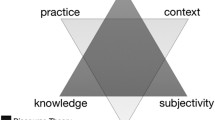Abstract
This dialogic chapter opens the book with a discussion between the two editors. We are presenting a collection that has contributions from around the world, with perspectives that don’t always agree with each other’s take on the concept; and that, in our view, is exciting. That diversity is also present between us, as an editorial team. Whilst we both share common interests and our different approaches to the field of event studies resonate significantly, we thought it would be interesting to share, through an informal conversation, something that illustrates where our perspectives cohere and diverge. By documenting a conversation, we felt that the ideas would emerge more organically and therefore be an accessible and interesting format for the beginning of the book.
J. Moss had contributed to this chapter along with E. Wood.
Access this chapter
Tax calculation will be finalised at checkout
Purchases are for personal use only
Similar content being viewed by others
References
Ashworth, P. (2003). An approach to phenomenological psychology: The contingencies of the lifeworld. Journal of Phenomenological Psychology, 34(2), 145–156.
Bourdieu, P. (1990). In other words: Essays towards a reflexive sociology (M. Adamson, Trans.). Stanford: Stanford University Press.
Bruner, E. M. (1986). Experience and its expressions. In V. W. Turner & E. M. Bruner (Eds.), The anthropology of experience (pp. 3–33). Chicago: University of Illinois Press.
Castoriadis, C. (1997). World in fragments: Writings on politics, society, psychoanalysis and the imagination (D. A. Curtis, Trans.). Stanford: Stanford University Press.
Dilthey, W. (1976/2010). Selected writings (H. Rickman, Trans. and Ed.). Cambridge: Cambridge University Press (Originally published in 1900).
Foucault, M. (1970). The order of things. London: Tavistock.
Giddens, A. (1991). Modernity and self-identity: Self and society in the late modern age. Cambridge: Polity Press.
Husserl, E. (1911/1965). Phenomenology and the crisis of philosophy. Translated from German by Quentin Lauer. New York: Harper & Row (Originally published in 1911).
Jackson, M. (1996). Introduction: Phenomenology, radical empiricism, and anthropological critique. In M. Jackson (Ed.), Things as they are: New directions in phenomenological anthropology (pp. 1–51). Bloomington: Indiana University Press.
Jackson, M. (2005). Existential anthropology: Events, exigencies and effects. Oxford: Berghahn.
Lacan, J. (1988). The seminar of Jacques Lacan. Book I: Freud’s papers on technique (J. Forrester, Trans.). Cambridge: Cambridge University Press.
Lacan, J. (1998). The seminar of Jacques Lacan. Book XI: The four fundamental concepts of psychoanalysis (A. Sheridan, Trans.). London: W. W. Norton.
Langdridge, D. (2007). Phenomenological psychology: Theory, research and method. Harlow: Pearson Education Limited.
Langdridge, D. (2008). Phenomenology and critical social psychology: Directions and debates in theory and research. Social and Personality Psychology Compass, 2(3), 1126–1142.
Larkin, M., Eatough, V., & Osborn, M. (2011). Interpretative phenomenological analysis and embodied, active, situated cognition. Theory and Psychology, 21(3), 318–337.
Mead, G. H. (1934). Mind, self and society. Chicago: University of Chicago Press.
Smith, J. A., Flowers, P., & Larkin, M. (2009). Interpretative phenomenological analysis: Theory, method and research. Los Angeles: Sage.
Smith, J. A., Harre, R., & Van Langenhove, L. (1995). Ideography and the case-study. In J. A. Smith, R. Harre, & L. Van Langenhove (Eds.), Rethinking psychology (pp. 59–69). London: Sage.
St. John, G. (2008). (Ed.). Victor Turner and contemporary cultural performance (pp. 1–37). New York: Bergham Books.
Thomassen, B. (2009). The uses and meanings of liminality. International Political Anthropology, 2(1), 5–27.
Turner, V. W. (1967). The forests of symbols: Aspects of Ndembu ritual. London: Cornell University Press.
Turner, V. W. (1969). The ritual process: Structure and anti-structure (1st ed.). Ithaca, USA: Cornell University Press.
Turner, V. W. (1974). Liminal to liminoid in play, flow and ritual: An essay in comparative symbology. Rice University Studies, 60(3), 53–92.
Turner, V. W. (1986). Dewey, dilthey, and drama: An essay in anthropology of experience. In V. W Turner & E. M. Bruner (Eds.), The anthropology of experience (pp. 33–450). Chicago: University of Illinois Press.
van Gennep, A. (1960). The rites of passage. Chicago: Chicago University Press.
Wittgenstein, L. (1952). Philosophical investigations. Oxford: Blackwells.
Author information
Authors and Affiliations
Corresponding author
Editor information
Editors and Affiliations
Rights and permissions
Copyright information
© 2020 The Author(s)
About this chapter
Cite this chapter
Lamond, I.R., Moss, J. (2020). What Is Liminality in Critical Event Studies Research?. In: Lamond, I., Moss, J. (eds) Liminality and Critical Event Studies. Palgrave Macmillan, Cham. https://doi.org/10.1007/978-3-030-40256-3_2
Download citation
DOI: https://doi.org/10.1007/978-3-030-40256-3_2
Published:
Publisher Name: Palgrave Macmillan, Cham
Print ISBN: 978-3-030-40255-6
Online ISBN: 978-3-030-40256-3
eBook Packages: Literature, Cultural and Media StudiesLiterature, Cultural and Media Studies (R0)




